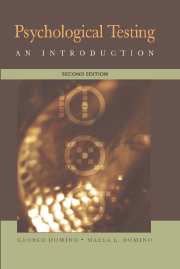Book contents
- Frontmatter
- Contents
- Preface
- Acknowledgments
- PART ONE BASIC ISSUES
- PART TWO DIMENSIONS OF TESTING
- PART THREE APPLICATIONS OF TESTING
- 9 Special Children
- 10 Older Persons
- 11 Testing in a Cross-Cultural Context
- 12 Disability and Rehabilitation
- PART FOUR THE SETTINGS
- PART FIVE CHALLENGES TO TESTING
- Appendix: Table to Translate Difficulty Level of a Test Item into a z Score
- References
- Test Index
- Index of Acronyms
- Subject Index
- References
9 - Special Children
from PART THREE - APPLICATIONS OF TESTING
Published online by Cambridge University Press: 05 June 2012
- Frontmatter
- Contents
- Preface
- Acknowledgments
- PART ONE BASIC ISSUES
- PART TWO DIMENSIONS OF TESTING
- PART THREE APPLICATIONS OF TESTING
- 9 Special Children
- 10 Older Persons
- 11 Testing in a Cross-Cultural Context
- 12 Disability and Rehabilitation
- PART FOUR THE SETTINGS
- PART FIVE CHALLENGES TO TESTING
- Appendix: Table to Translate Difficulty Level of a Test Item into a z Score
- References
- Test Index
- Index of Acronyms
- Subject Index
- References
Summary
AIM This chapter looks at psychological testing in the context of “special” children. We first look at some specific issues that range from the laws that have impacted the psychological testing of handicapped children, to issues of infant intelligence. In the process, we look at several instruments that are broad-based and nicely illustrate some of these issues. Then we look at nine major categories of special children, not exhaustively, but to illustrate various issues and instruments. Finally, we return to some general issues of this rather broad and complicated area.
SOME ISSUES REGARDING TESTING
Special children. Although all children are special, we will use the term “special children” as used in the literature, namely to signify children who have some condition that presents, at least potentially, difficulties in their development and in their learning so that they do not adapt or function at what may be considered the “normal” level.
Need to identify and assess. Recently, there has been a substantial increase in the need to identify and assess such children so that they may be given appropriate assistance. This increase is due to several factors. One is the advance of medical sciences. Children who years ago would have died at birth have now increased survival rates, but often the result is a child with disabilities. A second aspect is the passage in 1975 of Public Law 94–142, the Education for All Handicapped Children Act, which mandates a wide range of services for such children, as well as their right to an education.
- Type
- Chapter
- Information
- Psychological TestingAn Introduction, pp. 223 - 256Publisher: Cambridge University PressPrint publication year: 2006



